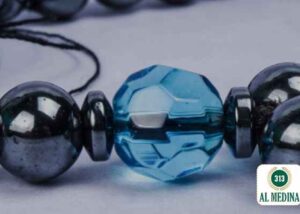Does removing Hijab make angels leave? Is it true that if a woman takes off her Hijab, angels go away – even if she is alone or with her family?
Quran
Hadith
Islamic Text
بِسْمِ اللَّهِ الرَّحْمَنِ الرَّحِيمِ
In the Name of Allah Most Merciful Most Kind
Short Answer
No, it is not true that removing hijab makes angels leave. A woman is allowed to remove her Hijab when she is alone or with Mahram relatives. Therefore, in the presence of mahram, when women remove their hijab, angels will not leave as a punishment. Obviously, she is required to wear Hijab in the presence of non-Mahram men and will be sinful if she does not do so.
Explanation
عَنْ خَدِيجَةَ، قَالَتْ: قُلْتُ: يَا رَسُولَ اللَّهِ، يَا ابْنَ عَمِّي، هَلْ تَسْتَطِيعُ إِذَا جَاءَكَ الَّذِي يَأْتِيكَ أَنْ تُخْبِرَنِي بِهِ؟ فَقَالَ لِي رَسُولُ اللَّهِ صَلَّى اللهُ عَلَيْهِ وَسَلَّمَ: نَعَمْ يَا خَدِيجَةُ. قَالَتْ خَدِيجَةُ: فَجَاءَهُ جِبْرِيلُ ذَاتَ يَوْمٍ وَأَنَا عِنْدَهُ، فَقَالَ رَسُولُ اللَّهِ صَلَّى اللهُ عَلَيْهِ وَسَلَّمَ: يَا خَدِيجَةُ هَذَا صَاحِبِي الَّذِي يَأْتِينِي قَدْ جَاءَ، فَقُلْتُ لَهُ: قُمْ فَاجْلِسْ عَلَى فَخِدِيَ الْأَيْمَنِ، فَقَامَ، فَجَلَسَ عَلَى فَخِدِيَ الْأَيْمَنِ، فَقُلْتُ لَهُ: هَلْ تَرَاهُ؟ قَالَ: نَعَمْ ، فَقُلْتُ لَهُ: تُحَوَّلْ فَاجْلِسْ عَلَى فَخِدِيَ الْأَيْسَرِ، فَجَلَسَ، فَقُلْتُ: هَلْ تَرَاهُ؟ قَالَ: نَعَمْ ، فَقُلْتُ لَهُ: فَتَحَوَّلَ فَاجْلِسْ فِي حِجْرِي، فَجَلَسَ، فَقَالَتْ لَهُ: هَلْ تَرَاهُ؟ قَالَ: نَعَمْ، قَالَتْ خَدِيجَةُ: فَتَحَسَّرْتُ وَطَرَحْتُ خِمَارِي، وَقُلْتُ لَهُ: هَلْ تَرَاهُ؟ قَالَ: لَا، فَقُلْتُ لَهُ: هَذَا وَاللَّهِ مَلَكٌ كَرِيمٌ، لَا وَاللَّهِ مَا هَذَا شَيْطَانٌ،
(Sayidah) Khadijah narrated: I said, O Messenger of Allah ﷺ, O my cousin, will you be able to inform me when the one who visits you comes to you? The Messenger of Allah ﷺ said, ‘Yes, Khadijah.’ Khadijah said: Gabriel came to him one day while I was with him. The Messenger of Allah ﷺ said: ‘Khadijah, this is my companion who visits me. He has arrived.’ So I said to him: Stand and sit on my right thigh. So he ﷺ got up and sat on my right thigh. I said: Do you see him? He ﷺ said: Yes. So I said: Turn and sit on my left thigh. So he ﷺ sat. I said: Do you see him? He ﷺ said: Yes. I said to him ﷺ: Turn and sit on my lap. He ﷺ sat there. She said to him: Do you see him? He ﷺ said: Yes. Khadijah said: So I uncovered my head and threw away my headscarf. Then I said to him ﷺ: Do you see him? He ﷺ said: No. So I said to him ﷺ: This, by Allah, is a noble angel. No, by Allah, this is not a devil. (Tabarani al-Mu’jam al-Awsat, 6435).
The Hadith is not Sahih
The Hadith narration above is used as evidence by some people to assert that angels do not enter a house or room where a woman has removed her Hijab. They explain that this is still the case even if it is Halal for her to do so. For example, some people still claim that if a woman removes her hijab when alone or with her husband, it still causes angels to leave. Therefore, such people say women should always keep their Hijab on. However, this is clearly incorrect for numerous reasons.
Firstly, the Hadith above is not Sahih. Imam al-Tabarani narrated the above Hadith and then highlighted the fact that it is only narrated through Yahya bin Sulayman. Yahya is certainly a weak narrator. It could be argued that he is a very weak narrator. Thus the Hadith is weak.
يحيى بن سُلَيْمَان بن نَضْلَة مدنِي يروي عَن مَالك حَدَّثنا عَنهُ عبد الله بن مُحَمَّد بن مُسلم يخطىء ويهم. (الثقات)
Yahya bin Sulaiman bin Nadlah is Madani. He narrated from Malik. Abdullah bin Muhammad bin Muslim narrated from him. He makes mistakes and forgets. (Imam Ibn Hibban, al-Thiqaat).
عَبد الرَّحْمَنِ بْنَ خِرَاشٍ يقول يَحْيى بن سليمان بن نضلة لا يسوى فلسا. (الكامل في ضعفاء الرجال)
Abdul Rahman bin Kharash said that Yahya bin Sulaiman bin Nadlah is not worth a penny. (Imam Abu Ahmad al-Jurjani, al-Kamil).
يحيى بن سليمان بن نضلة الخزاعي المدني. روى عن مالك، وسليمان ابن بلال. وعنه ابن صاعد وكان يفخم أمره. وقال ابن عقدة: سمعت ابن خراش يقول: لا يسوى شيئا. (ميزان الاعتدال في نقد الرجال)
Yahya bin Sulaiman bin Nadlah al-Khuza’i al-Madani. He narrated from Malik and Sulaiman ibn Bilal. Ibn Saa’id narrated from him, and he used to magnify his status. Ibn Uqdah said: I heard Ibn Kharash say: he is not worth anything. (Imam al-Dhahabi, Mizan al-Itidal 9537).
The contradiction
Secondly, the Hadith contradicts stronger narrations. Even if a Sahih Hadith were to contradict a stronger narration, it would be considered Shadh and thus very weak. When a Hadith that is not Sahih in itself contradicts significantly stronger narrations, then it will be even weaker. Such a narration is often referred to as Munkar in the science of Hadith. As such, this hadith is considered extremely weak.
يَا أُمَّ سَلَمَةَ لاَ تُؤْذِينِي فِي عَائِشَةَ، فَإِنَّهُ وَاللَّهِ مَا نَزَلَ عَلَيَّ الوَحْيُ وَأَنَا فِي لِحَافِ امْرَأَةٍ مِنْكُنَّ غَيْرِهَا
O Umm Salamah, do not trouble me regarding Aishah. For by Allah, the revelation has not descended upon me while I was under the blanket of any woman amongst you other than her. (Sahih al-Bukhari, 3775).
In the Hadith above, it is clear that the angel would come to the blessed Prophet ﷺ whilst he was lying in bed with Sayidah Ayeshah (May Allah Most High be pleased with her). It is obvious that Sayidah Ayeshah would not wear Hijab whilst sleeping. If anyone were to contest this fact, then the following Hadith in Sahih Muslim can be cited as definitive proof. This hadith makes it clear that Sayidah Ayesha would not wear Hijab to bed:
وَقَدْ وَضَعْتِ ثِيَابَكِ، وَظَنَنْتُ أَنْ قَدْ رَقَدْتِ، فَكَرِهْتُ أَنْ أُوقِظَكِ
The blessed Prophet ﷺ said to Sayidah Ayeshah: You had removed your clothes, and I thought you had fallen asleep. So, I was averse to waking you. (Sahih Muslim, 974 – 103).
Hanafi scholars
Thirdly, if it were the case that when a woman removes the Hijab angels leave even when she is alone or with Mahram relatives, then we would find Hanafi scholars warning against it. However, we do not find this warning in their authoritative works. Rather, they prohibit keeping pictures or dogs at home since those practices do lead to angels not entering the house:
عَنْ أَبِي طَلْحَةَ رَضِيَ اللَّهُ عَنْهُمْ، عَنِ النَّبِيِّ صَلَّى اللهُ عَلَيْهِ وَسَلَّمَ، قَالَ: لاَ تَدْخُلُ المَلاَئِكَةُ بَيْتًا فِيهِ كَلْبٌ وَلاَ صُورَةٌ
The Messenger of Allah ﷺ said, ‘The angels do not enter a house in which there is a dog or a picture.’ (Sahih al-Bukhari, 3322).
However, there is no prohibition found in prominent works of the Hanafi Madhab upon a woman removing her Hijab on the basis that is causes angels to leave.
Conclusion
As seen above, there is no sound Hadith alluding to the fact that women not wearing Hijab, when they are alone or with Mahrams, prevents angels from entering. Rather, there is definitive evidence to prove the contrary. Those people who are promoting this erroneous position are not only misrepresenting Hadith narrations but they are causing hardship.
Sadly, many sisters struggle with the observance of Hijab. Our focus should be upon encouraging them and supporting them to fulfil this religious obligation. Whereas, informing them that they must wear a Hijab even when they are alone may well be overwhelming. This incorrect approach may be the cause of an inroad for Shaytan, where he causes the individual to despair due to excessive hardship.
And Allah Most High Knows Best.
–Answered by Shaykh Noorud-deen Rashid (09.02.24)






